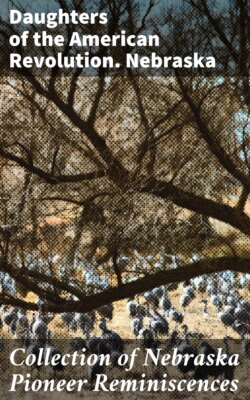Читать книгу Collection of Nebraska Pioneer Reminiscences - Daughters of the American Revolution. Nebraska - Страница 31
На сайте Литреса книга снята с продажи.
By Dr. Anna Robinson Cross
ОглавлениеTable of Contents
The early history of Crawford and its environment is replete with tales of Indian scares; the pioneer settlers banding themselves together and arming for protection against possible Indian raids, all presenting lurid material for the most exciting stories, if one could gather the accurate data.
The legend of Crow Butte is one of the most thrilling, and at the same time the most important, of the many tales told by the old settlers around the winter fireside.
In the early history of the Sioux and Crow Indians, much strife and ill-feeling was engendered between the two tribes by the stealing of horses. As no satisfactory settlement could be arranged between them, it was declared, after a solemn pow-wow, that a decisive battle should be fought, and the field for the said conflict was chosen on the land east of the present site of Crawford. The final stand was taken on one of the peculiar clay formations known as buttes, found in northwestern Nebraska. These eminences, dividing this section of the country into valleys and ridges of hills, add very much to the beauty of the landscape, by their seeming likeness to a succession of battlements and old castles.
This particular butte, standing like a sentinel about five miles east of Crawford, rises to a height of nearly three hundred feet on the east side, and is possible of ascent by gradual elevation on the west side. It appears to stand distinct and alone, forming a landmark on the horizon that has guided many a settler and traveler to home and safety. The writer is one of the number of travelers who, from bitter experiences in long winter drives over the prairie, has learned to appreciate the landmark of the old Crow Butte.
The Sioux, having driven the Crows to the top of this butte, thought, by guarding the path, they could quickly conquer by starving them out. Under cover of night the Crows decided, after due deliberation, that the warriors could escape, if the old men of the tribe would remain and keep up a constant singing. This was done. The young and able-bodied men, making ropes of their blankets, were let down the steep side of the butte, while the poor old men kept up a constant wailing for days, until death, from lack of food and exhaustion, had stilled their voices. As the singing gradually ceased, the Sioux, while watching, saw white clouds passing over the butte, having the appearance of large, white birds with outstretched wings, on which they carried the old men to the "Happy Hunting Grounds." The Sioux, awed by the illusion, believed it an omen of peace and declared that forever after there should be no more wars between the Crows and the Sioux.
Through Capt. James H. Cook, an early settler and pioneer of this section, who has served as scout and interpreter for the Indians for years, I have learned that it was near this Crow Butte that the last great treaty was made with the Indians, in which the whole of the Black Hills country was disposed of to the white people. According to his statement, the affair came very nearly ending in a battle in which many lives might have been lost. The bravery and quick action of a few men turned the tide in favor of the white people.
The following original poem by Pearl Shepherd Moses is quite appropriate in this connection:
TO CROW HEART BUTTE
Oh, lofty Crow Heart Butte, uprising toward the sun,
What is your message to the world below?
Or do you wait in silence, race outrun,
The march of ages in their onward flow?
Ye are so vast, so great, and yet so still,
That but a speck I seem in nature's plan;
Or but a drop without a way or will
In this mad rush miscalled the race of man.
In nature's poems you a period stand
Among her lessons we can never read;
But with high impulse and good motive found,
You help us toward the brave and kindly deed.
The winds and sunshine, dawns and throbbing star,
Yield you their message from the ether clear,
While moonlight crowns your brow so calm and fair
With homage kingly as their greatest peer.
A longing fills me as I nightly gaze;
Would I could break your spell of silence vast;
But centuries and years and months and days
Must add themselves again unto the past.
And I can only wish that I were as true,
Always found faithful and as firmly stand
For right as you since you were young and new,
A wondrous product from a mighty hand.
